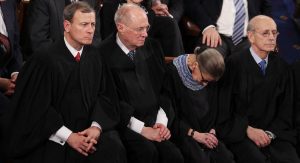Is RBG's State of the Union No-Show a No-No?
The justice's critics pounced on Twitter. But, in fact, it's common for Supreme Court justices to skip the annual presidential address.
January 29, 2018 at 03:39 PM
5 minute read
 Supreme Court Justice Elena Kagan, from left, Chief Justice John Roberts, Justice Anthony Kennedy, Justice Ruth Bader Ginsburg, Justice Stephen Breyer, and Justice Sonia Sotomayor arrive before President Barack Obama delivers the State of the Union address Tuesday, Jan. 12, 2016. (AP Photo/Evan Vucci)
Supreme Court Justice Elena Kagan, from left, Chief Justice John Roberts, Justice Anthony Kennedy, Justice Ruth Bader Ginsburg, Justice Stephen Breyer, and Justice Sonia Sotomayor arrive before President Barack Obama delivers the State of the Union address Tuesday, Jan. 12, 2016. (AP Photo/Evan Vucci) Social media erupted over the weekend when news spread that U.S. Supreme Court Justice Ruth Bader Ginsburg won't be attending President Donald Trump's first State of the Union address Tuesday.
Some critics accused the 84-year-old justice of boycotting the president because of her publicly voiced distaste for Trump during the 2016 campaign, which she later said was “ill-advised.”
“Maybe she's house hunting in Canada?” was one tweet, a reminder that Ginsburg once hinted it might be time to move out of the United States if Trump was elected.
Others said justices had a duty to attend, no matter what they think of the president, while more than a few naysayers used the occasion to mock Ginsburg's penchant for nodding off during past State of the Union addresses.
“It's not fair that ppl are criticizing Justice Ginsberg for skipping SOTU!” former Arkansas Gov. Mike Huckabee tweeted, misspelling the justice's name as many people do. “Security concerns wouldn't allow her to bring CPAP machine into House chamber.” To illustrate his point, Huckabee included a 2015 photo (right) showing Ginsburg's head bowed while other justices listened attentively.
But the critics ignored two facts. Ginsburg nailed down two public appearances in Rhode Island for Tuesday long before the date of the State of the Union address was announced. And it is not uncommon for Supreme Court justices—liberal or conservative—to steer clear of the presidential address.
It was Aug. 31 of last year when Roger Williams University School of Law announced that Ginsburg would be on campus Tuesday for a public “fireside chat” with Bruce Selya, senior judge on the U.S. Court of Appeals for the First Circuit. Around the same time, she scheduled another event at a Providence synagogue for Tuesday night. It is typical for justices to arrange more than one event in the same area on the same day during out-of-town trips.
When she made the arrangements, she could not have known that Trump's State of the Union address would take place on the same day. As is customary, the date of the president's address before a joint session of Congress is worked out between the White House and the speaker of the House of Representatives. Speaker Paul Ryan first announced last Nov. 30 that Jan. 30 would be the day for Trump's talk.
No matter what the reason, Supreme Court justices have an uneven record of attendance at the State of the Union address. No justices at all showed up in 1975 and 2000. A possible factor is that both years came soon after cataclysmic political events; Richard Nixon's resignation in 1974 and Bill Clinton's impeachment trial in 1999.
For three years in a row in the early 2000s, according to a study of Supreme Court attendance, only one justice attended: Stephen Breyer, a political junkie who used to work in the Senate and thought it was important for all three branches of government to be on display. “In the State of the Union is the federal government, every part,” Breyer once explained. “The president, the Congress, the cabinet, the military, and I would like them to see the judges, too, because federal judges are also part of that government. And I want to be there.”
The late Justice Antonin Scalia quit attending in 1998, also according to the 2011 study by political scientists Todd Peppers and Michael Giles. Justice Samuel Alito Jr. has also mostly stayed away, complaining that justices have to behave like “potted plants,” careful not to applaud for anything political that the president says, for fear that clapping might be construed as an endorsement.
In 2010, Alito did attend and faced criticism for mouthing the words “not true” when President Barack Obama criticized the Supreme Court's Citizens United decision during the address.
The following year, Alito somehow found himself almost as far away from the State of the Union address as humanly possible. He served as jurist-in-residence at the University of Hawaii School of Law.
This content has been archived. It is available through our partners, LexisNexis® and Bloomberg Law.
To view this content, please continue to their sites.
Not a Lexis Subscriber?
Subscribe Now
Not a Bloomberg Law Subscriber?
Subscribe Now
NOT FOR REPRINT
© 2025 ALM Global, LLC, All Rights Reserved. Request academic re-use from www.copyright.com. All other uses, submit a request to [email protected]. For more information visit Asset & Logo Licensing.
You Might Like
View All
Trump RTO Mandates Won’t Disrupt Big Law Policies—But Client Expectations Might
6 minute read
Trump's RTO Mandate May Have Some Gov't Lawyers Polishing Their Resumes
5 minute read
Trump Administration Faces Legal Challenge Over EO Impacting Federal Workers
3 minute readTrending Stories
- 1Gunderson Dettmer Opens Atlanta Office With 3 Partners From Morris Manning
- 2Decision of the Day: Court Holds Accident with Post Driver Was 'Bizarre Occurrence,' Dismisses Action Brought Under Labor Law §240
- 3Judge Recommends Disbarment for Attorney Who Plotted to Hack Judge's Email, Phone
- 4Two Wilkinson Stekloff Associates Among Victims of DC Plane Crash
- 5Two More Victims Alleged in New Sean Combs Sex Trafficking Indictment
Who Got The Work
J. Brugh Lower of Gibbons has entered an appearance for industrial equipment supplier Devco Corporation in a pending trademark infringement lawsuit. The suit, accusing the defendant of selling knock-off Graco products, was filed Dec. 18 in New Jersey District Court by Rivkin Radler on behalf of Graco Inc. and Graco Minnesota. The case, assigned to U.S. District Judge Zahid N. Quraishi, is 3:24-cv-11294, Graco Inc. et al v. Devco Corporation.
Who Got The Work
Rebecca Maller-Stein and Kent A. Yalowitz of Arnold & Porter Kaye Scholer have entered their appearances for Hanaco Venture Capital and its executives, Lior Prosor and David Frankel, in a pending securities lawsuit. The action, filed on Dec. 24 in New York Southern District Court by Zell, Aron & Co. on behalf of Goldeneye Advisors, accuses the defendants of negligently and fraudulently managing the plaintiff's $1 million investment. The case, assigned to U.S. District Judge Vernon S. Broderick, is 1:24-cv-09918, Goldeneye Advisors, LLC v. Hanaco Venture Capital, Ltd. et al.
Who Got The Work
Attorneys from A&O Shearman has stepped in as defense counsel for Toronto-Dominion Bank and other defendants in a pending securities class action. The suit, filed Dec. 11 in New York Southern District Court by Bleichmar Fonti & Auld, accuses the defendants of concealing the bank's 'pervasive' deficiencies in regards to its compliance with the Bank Secrecy Act and the quality of its anti-money laundering controls. The case, assigned to U.S. District Judge Arun Subramanian, is 1:24-cv-09445, Gonzalez v. The Toronto-Dominion Bank et al.
Who Got The Work
Crown Castle International, a Pennsylvania company providing shared communications infrastructure, has turned to Luke D. Wolf of Gordon Rees Scully Mansukhani to fend off a pending breach-of-contract lawsuit. The court action, filed Nov. 25 in Michigan Eastern District Court by Hooper Hathaway PC on behalf of The Town Residences LLC, accuses Crown Castle of failing to transfer approximately $30,000 in utility payments from T-Mobile in breach of a roof-top lease and assignment agreement. The case, assigned to U.S. District Judge Susan K. Declercq, is 2:24-cv-13131, The Town Residences LLC v. T-Mobile US, Inc. et al.
Who Got The Work
Wilfred P. Coronato and Daniel M. Schwartz of McCarter & English have stepped in as defense counsel to Electrolux Home Products Inc. in a pending product liability lawsuit. The court action, filed Nov. 26 in New York Eastern District Court by Poulos Lopiccolo PC and Nagel Rice LLP on behalf of David Stern, alleges that the defendant's refrigerators’ drawers and shelving repeatedly break and fall apart within months after purchase. The case, assigned to U.S. District Judge Joan M. Azrack, is 2:24-cv-08204, Stern v. Electrolux Home Products, Inc.
Featured Firms
Law Offices of Gary Martin Hays & Associates, P.C.
(470) 294-1674
Law Offices of Mark E. Salomone
(857) 444-6468
Smith & Hassler
(713) 739-1250










